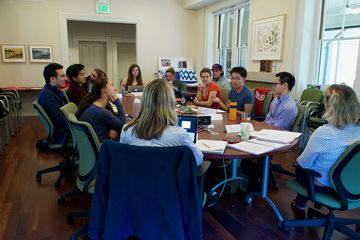Teaching Overview

Bing's international reputation for excellence is also based on our contribution to undergraduate and graduate education and the quality of the Stanford students who have studied in the school. Bing offers courses in child development where students learn through coursework, participation and observation in the classrooms.
These students have gone on to become psychologists, teachers, social workers, pediatricians, attorneys, child psychiatrists, etc. Most have become parents. We hope that all Stanford students who work at Bing become child advocates as a result of their experience in an excellent program for young children.
Psychology courses have been taught through Bing since the 1940's and are taught by the Director, Associate Director and Head Teachers.
These include the following classes taught at Bing:
- Psychology 146, Observation of Children
- Learning about children through guided observations at Bing Nursery School: physical, emotional, social, cognitive, and language development.
- Psychology 147, Development in Early Childhood
- Supervised experience with young children at Bing Nursery School. Seminar on developmental issues in the Bing teaching/learning environment.
- Psychology 60A, Laboratory section for Introduction to Developmental Psychology (Psych 60)
- Guided observation of children age 2-5 years at Bing Nursery School.
- Human Biology 4Y, Practicum in Young Child and Family Development
- Practical experience through guided observations at Bing Nursery School for Human Biology Core (4B).
In addition, students from a number of other courses carry out projects and make extensive use of Bing. These include:
- Psychology 110, Research Methods and Experimental Design
- Structured research exercises and design of an individual research project.
- Linguistics 140 (240), Language Acquisition I
- Processes of language acquisition in early childhood; stages in development; theoretical issues and research questions. Practical experience in data collection.